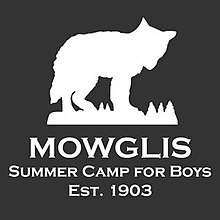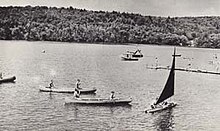

This article has multiple issues. Please help improve it or discuss these issues on the talk page. (Learn how and when to remove these template messages)
|
| Camp Mowglis | |
|---|---|
 | |
|
| |
| Location | East Hebron, New Hampshire |
| Coordinates | 43°41′46″N 71°46′15″W / 43.69611°N 71.77083°W / 43.69611; -71.77083 |
| Operated by | Holt Elwell Memorial Foundation |
| Established | 1903 (1903) |
| Website | www |
Camp Mowglis | |

Mowglis campers loading crew boat
| |
| NRHP reference No. | 100004085 |
| Added to NRHP | June 20, 2019 |
Camp Mowglis is a nonprofit residential camp for boys. Founded in 1903, it is one of the oldest summer camps in the United States. It is located in Hebron, New Hampshire, on the shores of Newfound Lake. It's owned by the nonprofit Holt Elwell Memorial Foundation.[1] Mowglis was founded by Elizabeth Ford Holt and the camp includes some themes from the Jungle Books.[2] The camp was listed on the National Register of Historic Places in 2019.
The symbol of the camp is a wolf cub. The Mowglis Mountain and its Mowglis Trail in New Hampshire get their name from the camp. Many of the surrounding trails were maintained by the camp's boys.[3]

At the turn of the last century, Elizabeth Ford Holt, a reformer from Cambridge, Massachusetts, became interested in establishing summer camps to encourage character development in children. In 1900, she started a short-lived camp for girls, Redcroft, which historian Barksdale Maynard called "the first girls camp of significance."[4] Three years later, Holt purchased the Barnard Farm on the shores of Newfound Lake and founded the Mowglis School of the Open.[5] Holt contacted Rudyard Kipling while living at Naulakha in nearby Dummerston, Vermont, and received his permission to borrow names and themes from the Jungle Books.
Rudyard Kipling and his wife Carrie held a lifelong fascination with Camp Mowglis, a summer camp that continues to uphold traditions inspired by Kipling. The camp's wooden structures bear names such as Akela, Toomai, Baloo, and Panther, evoking the imagery from Kipling's famous story, "The Jungle Book." The campers, ranging from the youngest "Cubs" to the oldest residing in the "Den," are collectively referred to as "the Pack."[6]
Col. Alcott Farar Elwell, who contributed to the development of many trails in the Mount Carrigan region, was the camp director for more than 50 years.[7]

In 2012, Camp Director Sam Punderson retired, and the foundation hired Nick Robbins as the new director. A graduate of Colorado College, Robbins has been a year-round camp director for the camp since 2013.[8] Robbins is active with the American Camp Association and certified Outdoor Emergency Care Provider with the National Ski Patrol.[9]
